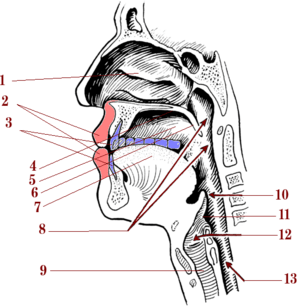Pronunciation facts for kids
Pronunciation is how we say words or a whole language. It's about the sounds we make when we speak. Sometimes, it means the way most people agree a word should sound in a certain dialect. Other times, it just means how one person says a word.
Words can be said differently by various people or groups. This depends on many things. For example, where someone grew up can affect their pronunciation. The place they live now also plays a role. Sometimes, speech or voice disorders can change how someone speaks. A person's ethnic group, social class, or education can also influence their pronunciation.
Contents
Understanding How We Pronounce Words
When we talk about pronunciation, we look at the sounds we use. These sounds are called phones. They are the smallest units of sound in a language.
What are Syllables?
Words are made of syllables. A syllable is a unit of sound. For example, the word "water" has two syllables: "wa-ter". Each syllable has at least one vowel sound.
Studying Language Sounds
The study of these sounds is called phonetics. Phonetics looks at how we make sounds with our mouth, tongue, and throat. It also studies how we hear and understand sounds.
What are Phonemes?
Sounds that play a similar role in a language are grouped together. These groups are called phonemes. A phoneme is the smallest unit of sound that can change the meaning of a word. For example, the 'p' sound in "pat" and the 'b' sound in "bat" are different phonemes. Changing one makes a new word.
The International Phonetic Alphabet
To describe speech sounds accurately, experts use the International Phonetic Alphabet (IPA). The IPA is a special system of symbols. Each symbol stands for a unique sound. This helps people from different languages understand how sounds are made.
See also
 In Spanish: Pronunciación para niños
In Spanish: Pronunciación para niños
 | George Robert Carruthers |
 | Patricia Bath |
 | Jan Ernst Matzeliger |
 | Alexander Miles |


